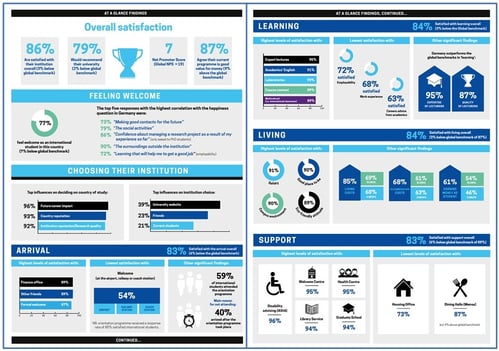Universities the world over are competing for the same pool of international students. So insight into this market, and why international students choose a country to study in, their host country, is of particular interest to marketing teams that are keen to recruit these students to their universities.
In Germany, international student market research is commissioned by GATE-Germany, a consortium for international higher education marketing of German universities, which is part of the marketing department of the German Academic Exchange Service (the DAAD). GATE-Germany utilises various sources of data, including student surveys, to inform its marketing strategies.
This article summarises how a large country like Germany uses data from the International Student Barometer; however, countries of all sizes, and the individual universities that participate too, can benefit from the insights gleaned in this global benchmarking exercise.
We interviewed GATE-Germany’s Dr. Nesrin Calagan about one source of this data - the International Student Barometer (ISB) - a worldwide survey of international students across all student types, levels and years of study, that is used to track the international student experience.
Dr Calagan, who is in charge of studies and publications on international higher education marketing, and is therefore responsible for the supervision of the ISB report within DAAD, explained what the report offers German universities:
“At GATE-Germany, we provide evidence-based marketing expertise to German universities. We offer a worldwide network and a broad portfolio of marketing instruments to enable German universities to position themselves internationally.
The DAAD itself, but also in cooperation with other institutions, conducts studies on the internationalisation of German universities. As an international benchmark study, the ISB offers the DAAD and the German universities the possibility to compare their own status quo with a European and global comparison. The ISB benchmarks can be tracked over a long period of time.
"Findings from the ISB offer universities new food for thought, in order to match the international students with the appropriate host universities and thus ensure their academic success.”
DAAD most recently participated in the survey in the Autumn 2018 intake; during which 195,182 international students responded from 212 institutions across 21 countries. Data collated from the survey was analysed and institution-specific results were compared against comparator groups, as well as national and international benchmarks. The ISB reports, which are delivered in person, are confidential and customised to each institution that participates.
In this Q&A, we asked Dr. Calagan to share her thoughts on some of the findings from the 2018/2019 report:
Q: What value do you think the ISB brings to individual German institutions?
“I think the ISB Report’s target group is primarily the universities themselves. The universities use the results to further develop their support services for international students. This is useful not only to the universities, but also the international students themselves; it facilitates their integration into academic life in Germany and ultimately leads to better study results.”
Q: How has DAAD used the insight from the ISB over the last 4 years?
“We do not participate in the ISB benchmark study on a yearly basis, but we do participate at regular intervals. This gives the participating universities enough time to analyse their data, to implement necessary marketing instruments and, last but not least, to monitor their action by repeating participation in the ISB-study.”
 GATE-Germany 2019/19 ISB Report 'At-a-glance' findings
GATE-Germany 2019/19 ISB Report 'At-a-glance' findings
Q: Were any findings from the 2018 survey of particular interest to the DAAD?
“In addition to the positive results of the ISB Report 2018 (2019) in terms of international student satisfaction at German universities (high quality of education and high reputation of academic degrees), it is of course important to find out on what point in the student-life-cycle we can implement marketing instruments to anticipate the needs of international students at German universities. The results of the ISB Report 2018/19 clearly point to two areas:
Q: How have the findings benefited international students in Germany?
“The results of the study enable German universities to adapt their marketing measures to the current needs of international students.”
Coventry University currently attracts over 30,000 students from around 150 countries. Overseas students are primarily located in the major campuses...
Durham University is very much aware of the unique and distinctive student experience the institution is able to offer, and maintaining high...
Universität Bayreuth took part in the International Student Barometer (ISB) for the first time in 2010. The ISB is the largest annual survey of...